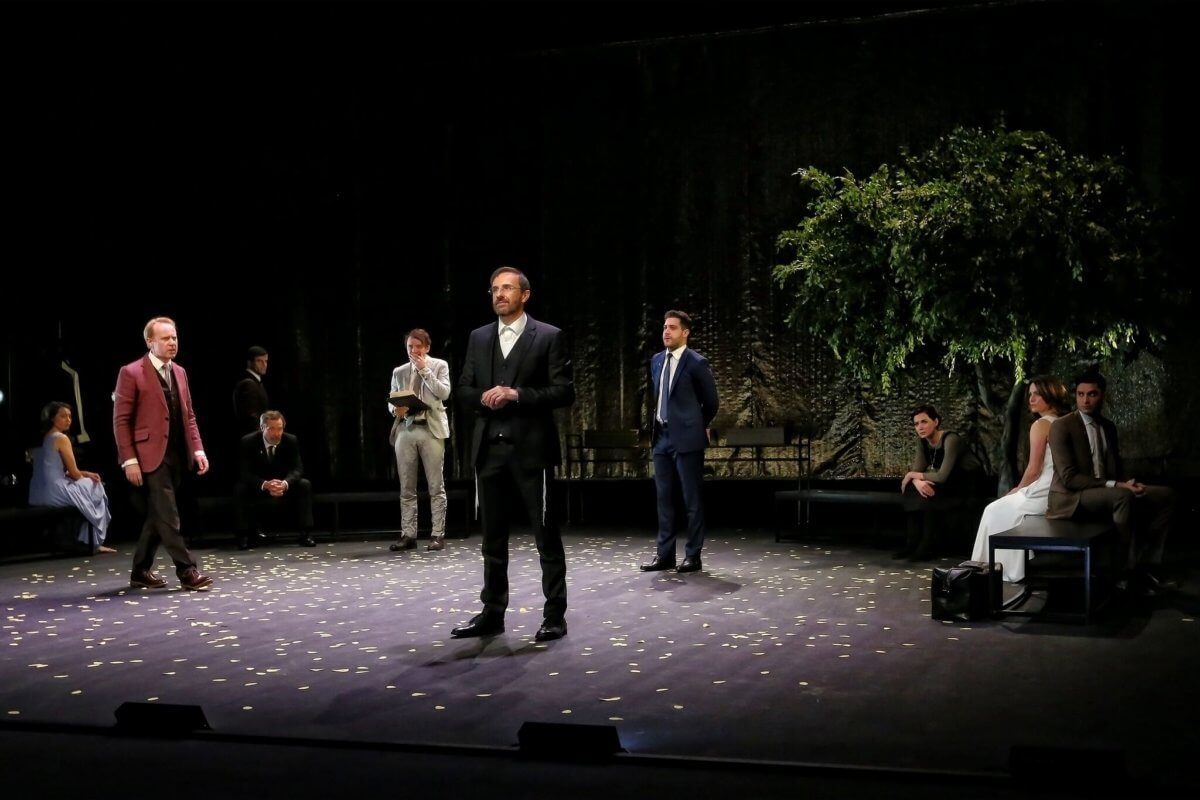It is likely that this review will not do justice to the Bell Shakespeare production of The Merchant of Venice: it is one of my favourite interpretations of a Shakespeare play. Director Anne-Louise Sarks’ portrayal of the familiar characters is refreshing and insightful, revealing a clever take on events, and focusing on the humanity of the characters rather than a simple Jewish/Christian dichotomy.
The Shakespearian comedy follows Shylock, Portia, Bassanio and Antonio in their quest for love set against the backdrop of a multi-faith Venetian society.
The representation of women in Shakespearean plays is often a struggle for directors. The treatment of women as an afterthought was typical of the time, and they reflect this reality. However, the Merchant of Venice offers directors the rare treat of two women, Portia and Nerissa, who seize control of the situation and are even more capable than the men. Sarks made the most of this opportunity, with Jessica Tovey and Catherine Davies playing the two sarcastic and fun women. Nerissa’s moments transform with eye rolls and exaggerated gestures from meek and passive to fun and engaged. Meanwhile, Portia’s struggles to make her high heels look presentable and to hide her disgust for hilariously vain potential suitors adds to the quality of this physical comedy. Female characters rarely get the chance to engage with such humour, and this addition gives the characters a third dimension.
The inherent privilege experienced by the wealthy Christian merchants juxtaposes this development and focus on the capability of the female characters. It is precisely this strong sense of connection to the women that make Portia’s sentencing scene in court more repulsive. It is undoubtedly Mitchell Butel’s Shylock who steals the show. Since his first scene, we see him as a man who, although treated as an equal before the law, is a victim of constant harassment, assault and mocking by society. Shylock, for the beginning of the play, withstands this abuse and tries simply to live some sort of honest life under these conditions. His tough facade fell away in scenes with his daughter, Jessica, and he becomes a man whose sole purpose is to protect and support his daughter.
Through this lens, we experience his descent into a man who is blinded by pain and calling for Antonio’s flesh in the courtroom. The pain of losing his daughter, and an especially potent ‘Hath not a Jew eyes?’ monologue brought tears to my eyes. Instead of someone whose religion explains their evil, the audience pities and sympathises with Shylock, as we ultimately question the self-righteousness of the ‘good’ Christians.
Launcelot’s comedic role transitions from seemingly unimportant, but welcome laugh, in the first act to a vital role the second act. As the audience tries not to turn away from Shylock’s displays of pure human pain, Launcelot’s injections provide a welcome chance to breathe. Jacob Warner’s portrayal of the character flows beyond the script and really connects with the audience. Any cheekiness feels like we’re a part of an in-joke, and the audience is the first to celebrate Launcelot’s successes, such as his new suit while sharing in his hopes.
The set is simple, and the cast is onstage for the entirety of the play, even changing costumes in plain sight. Long, simple benches line the centre of the stage, from which the inactive cast members sit. Making for a second audience, they watch along with us – their static presence magnifying the emotionally-charged silence that surrounds many of the anti-Semitic actions towards Shylock while adding to the sense of energy in the elated scenes.
Although the light-heartedness of the play shines through in some parts, others are almost hard to watch. Jessica’s reaction to her father’s fate and the sombre reality of life in Venice for men such as Shylock, for example, are some of these. Walking out of the theatre, we question our own prejudices and our treatment of others. Most of the tickets have already sold out, but the Canberra Theatre Centre has some affordable prices for those under the age of 30s, so if you have the time this week, it’s worth a night out from your week 11 studying.
We acknowledge the Ngunnawal and Ngambri people, who are the Traditional Custodians of the land on which Woroni, Woroni Radio and Woroni TV are created, edited, published, printed and distributed. We pay our respects to Elders past and present. We acknowledge that the name Woroni was taken from the Wadi Wadi Nation without permission, and we are striving to do better for future reconciliation.
